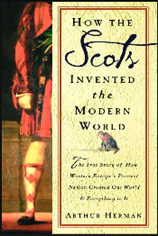How the Scots Invented the Modern World
 |
|
| Author | Arthur Herman |
|---|---|
| Country | United States |
| Subject | Scottish Enlightenment |
| Genre | Non-fiction |
| Publisher | Crown Publishing Group, Three Rivers Press |
|
Publication date
|
November 2001 |
| Media type | |
| Pages | 392 |
| ISBN | |
| OCLC | 46857817 |
| 941.1 21 | |
| LC Class | DA772 .H53 2001 |
How the Scots Invented the Modern World: The True Story of How Western Europe's Poorest Nation Created Our World & Everything in It (or The Scottish Enlightenment: The Scots invention of the Modern World) is a non-fiction book written by American historian Arthur Herman. The book examines the origins of the Scottish Enlightenment and what impact it had on the modern world. Following the Great Man approach, Herman focuses on individuals and presents their biographies in the context of their individual fields and also in terms of the theme of Scottish contributions to the world.
The book was published as a hardcover in November 2001 by Crown Publishing Group and as a trade paperback in September 2002. Critics found the thesis to be over-reaching but descriptive of the Scots' disproportionate impact on modernity. In the American market, the trade paperback peaked at #3 on The Washington Post bestseller list, while in the Canadian market it peaked at #1.
At the time of publication, the author was the coordinator of the Western Civilization Program at the Smithsonian Institution in Washington, DC. The book grew out of a class topic at the Smithsonian regarding intellectual life in Edinburgh in the 18th century. Herman was impressed by the fact that so many prominent individuals who had a significant impact on modernity had come from such a specific geographic location and time-frame.
Herman had only once been to Scotland as a teenager when his father, a professor, spent a semester at Edinburgh University. Though born and raised in the Midwestern United States, his ancestry traces back to Norway; there are no Scots in his ancestral background of whom he is aware.
The book is divided into two parts. The first part, Epiphany, consists of eight chapters and focuses on the roots, development, and impact of the Scottish Enlightenment on Scotland and Great Britain. The roots come from an appreciation for democracy and literacy that developed from the Scottish Reformation, when John Knox brought Calvinist Presbyterianism to Scotland. He preached that God ordained power into the people and that it was for the people to administer and enforce God's laws, not the monarchy. For common people to understand God's laws they had to be able to read the Bible, so schools were built in every parish and literacy rates grew rapidly, creating a Scottish-oriented market for books and writers.
...
Wikipedia
